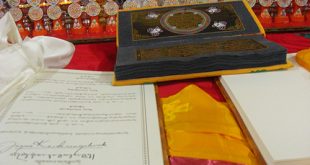The Bhutan Hardware Association (BHA) has raised concerns regarding the upcoming Goods and Services Tax (GST) regime and how it might negatively affect the sector if certain actions are not taken or clarified.
BHA Chair, Thinley Dorji, said members are confused about what will happen to the existing stock on which 10 percent Bhutan Sales Tax (BST) has already been paid. With GST trainings drawing near, he said there is still uncertainty around the matter.
According to him, the association has already submitted two letters to the Department of Revenue and Customs highlighting the issue.
The first letter, submitted on 14th August outlined concerns about pre-GST stocks. It stated that hardware businesses usually keep large inventories to ensure smooth operations. At present, BST at 10 percent is paid when goods enter the country. Under the GST framework, the rate for similar goods will drop to 5 percent. While the revision is positive in the long run, BHA said it creates short-term problems.
For unsold goods purchased under the current BST system, the letter asked for clarification on whether there will be a system to adjust the difference and refund the excess BST already paid. It also pointed out that if GST is applied to all sales from 2026 onwards without adjustment, the same goods will end up being taxed twice, once under BST (10 percent) and again under GST (5 percent).
The letter further noted that there has been no official guidance on whether pre-GST stock will qualify for input tax credit, stock adjustment, or other relief measures. The association warned that this uncertainty could cause unnecessary losses, particularly for small and medium enterprises, during the early phase of GST rollout.
BHA requested a public clarification on transitional rules for pre-GST stocks, a system for input tax credit or stock adjustment for goods bought under the current BST regime, and a consultation or sensitization session specifically for the hardware sector to help ensure readiness and compliance.
A second letter was sent on 26th August referring back to the 14th August letter. In it, BHA acknowledged a government notification dated 19th August which clarified that no transitional credit would be available for goods purchased before January 2026 and that taxes paid under the previous system would not be eligible for GST input credit.
While welcoming the clarification, BHA submitted a follow-up appeal for reconsideration. The letter highlighted the risk of double taxation, explaining that goods already taxed at 10 percent BST would again face 5 percent GST from 2026, leading to unfair differences between sellers of pre-GST stock and importers under 5 percent GST,disadvantages for businesses unable to sell stock before 2026, as Indian imports may become cheaper and price volatility that could affect consumers during the transition.
The letter also cited international precedents. India, during its 2017 GST rollout, allowed transitional credit for excise duty and VAT on pre-GST stock. Singapore permitted input tax credits on pre-GST stock during its 1994 GST introduction, while Malaysia introduced a transitional input tax credit scheme in 2015 for sales tax and VAT paid on existing stock. BHA said these examples show that governments recognized businesses should not be taxed twice on the same goods during a system change.
In its latest appeal, BHA requested the government to reconsider providing transitional relief, such as allowing input tax credit, partial adjustment, or refund of excess BST on stock purchased before January 2026 but sold thereafter. It also asked the government to explore mechanisms to offset double taxation even if no refund mechanism is put in place, and to engage with stakeholders for a pragmatic and transparent approach that balances government revenue interests with business sustainability.
The Chair said that so far, BHA has not received a concrete response from the government and is still waiting for a reply.
 The Bhutanese Leading the way.
The Bhutanese Leading the way.




